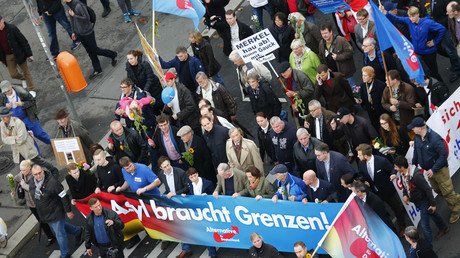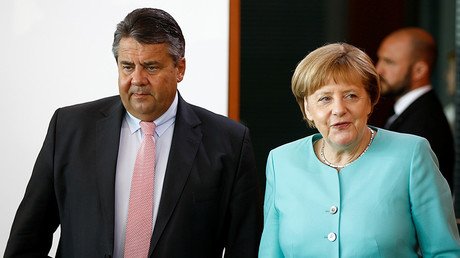Right-wing AfD beats Merkel party in regional elections – exit polls
The right-wing, anti-immigrant Alternative for Germany party (AfD) has placed second in state elections, ahead of Chancellor Angela Merkel’s Christian Democratic Union (CDU) in her home state, exit polls say.
According to the latest estimates by the German ZDF channel, the AfD has received over 21 percent of the vote in the local elections in the state of Mecklenburg-Vorpommern.
Merkel’s Christian Democratic Union (CDU) has so far placed third, gaining 19 percent of the votes, compared to 23 in the previous elections in 2011. The ruling Socialist Democratic Party (SPD) has garnered 30 percent, which is 5 percent less than four years ago.
The projected win for the AfD, whose leaders have repeatedly demanded tougher anti-immigrant laws and lambasted Merkel for her open-door policy towards refugees, comes just a year before the federal elections.
"This is a slap in the face for Merkel,” AfD co-leader Frauke Petry said.
“The voters made a clear statement against Merkel's disastrous immigration policies. This put her in her place."
According to German officials, the country welcomed over 1 million refugees in 2015. The AfD has managed to gain voters from various parties, according to Petry.
“The reason for that is that the voters have not been listened to for a long time,” she said, as quoted by Focus media outlet.
Established in 2013 following the euro crisis, the AfD has entered the local elections in Mecklenburg-Vorpommern for the first time. The party is already represented in eight out of 16 state parliaments.
It gained its best results in March this year in the federal state of Sachsonia-Anhalt, winning 24.3 percent and becoming the second strongest party after the CDU.
Speaking to RT, the head of AfD’s Berlin branch, Georg Pazderski, said that the support his party gained in Merkel’s home state is because “people see that there is something wrong with this country” and that change is needed.
Pazderski also voiced optimism that the AfD will get enough votes to make it into the federal parliament (Bundestag) in next year’s elections.
“We are bringing people to the ballot box [who] did not vote five years ago,” he said, referring to recent polls that say 40 percent of AfD voters ignored the last elections in Mecklenburg-Vorpommern.
Pazderski said that while attracting supporters from various rival parties, including Merkel’s CDU, the AfD became a “party of citizens.”
RT also spoke to AfD economic spokesman Hans Joerg Mueller. He said that the party’s initial popularity was based on an anti-immigration mood in society.
“We were dragged in by emotions. The emotions were built on Islam… on German people not willing to be changed on their own soil [by immigrants]."
However, Mueller stated that in “order to grow more, to gain more support” the party should address a broader spectrum of issues, which are largely present in the election campaign programs of the AfD, according to the politician. Changing the country’s taxation system would be one of the major goals for the AfD, Mueller said.
"It is a serious political defeat for the Chancellor in her home state," Ralf Stegner, SPD deputy chairman, said in response to the exit polls, Der Spiegel reported.
Michael Grosse-Broemer, parliamentary manager of the CDU fraction in the Bundestag, said that government policies have “to a certain point” contributed to the success of the AfD.
“We are concerned that the AfD has managed to stir up the fears… of the people,” SPD deputy chairwoman Manuela Schwesig said on Sunday.














